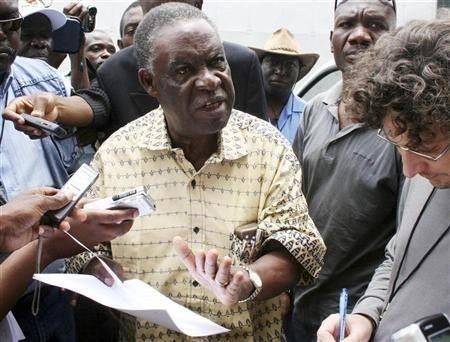Zambia deploys police on eve of close election

Zambia's police chief deployed thousands of officers across the southern African country on Monday, the eve of a closely contested election between incumbent Rupiah Banda and nationalist opposition leader Michael Sata.
Police Inspector-General Francis Kabonde told a news conference security forces would be taking no chances with the September 20 vote, despite Africa's biggest copper producer being a relative stranger to political violence or unrest.
Thousands of police officers have been deployed. The police will be in all townships and streets, he said.
An opinion poll published a week ago suggested Banda held a narrow lead over Sata -- nicknamed King Cobra on account of his vicious tongue -- although a number of undecided meant an upset was still possible.
Patriotic Front (PF) leader Sata lost to Banda by just 35,000 votes, or two percent of the electorate, in a 2008 run-off. Banda appeared on state television on Sunday to announce that any troublemakers would be arrested.
However, a strong performance by the kwacha, Zambia's currency, in the last week suggests few investors either inside or outside the country are worried about violence or prolonged post-election disputes disrupting the economy or government.
The kwacha has gained more than 2 percent against a strengthening dollar in the last five days, and briefly touched a six-week high of 4,780 on Monday.
By contrast, Nigeria's naira and Uganda's shilling both fell ahead of elections this year as companies and individuals stocked up on dollars in case polling day unleashed unrest, as happened in Kenya in late 2007.
COOL IT
Campaigning officially ended on Sunday to allow for a 24-hour cooling off period after six-weeks of mudslinging and rhetoric that occasionally touched on the growing clout of foreign mining firms, most notably from China.
Sata, whose long and varied career includes work in British car assembly plants, has been a vocal critic of Asian mining investment, but toned it down in an interview with Reuters on Friday, saying he would keep Zambia's strong diplomatic and commercial ties with Beijing.
Chinese firms have become major players in the former British colony's $13 billion economy, with total investments by the end of 2010 topping $2 billion, according to Chinese embassy data.
Banda's Movement for Multi-party Democracy, which has run the nation of 13 million since the end of one-party rule in 1991, claims most of its support in the countryside, where farmers have benefitted from a hugely successful agricultural subsidy scheme.
Sata's strength is in the capital, Lusaka, and the northern Copper Belt, where many people complain about receiving meager returns from more than five years of strong economic growth.
An alliance between Sata and another opposition party, the UPND, crumbled this year, improving the chances of a new full five-year term for Banda, who moved into the presidency after the 2008 death of his predecessor, Levy Mwanawasa.
© Copyright Thomson Reuters {{Year}}. All rights reserved.





















